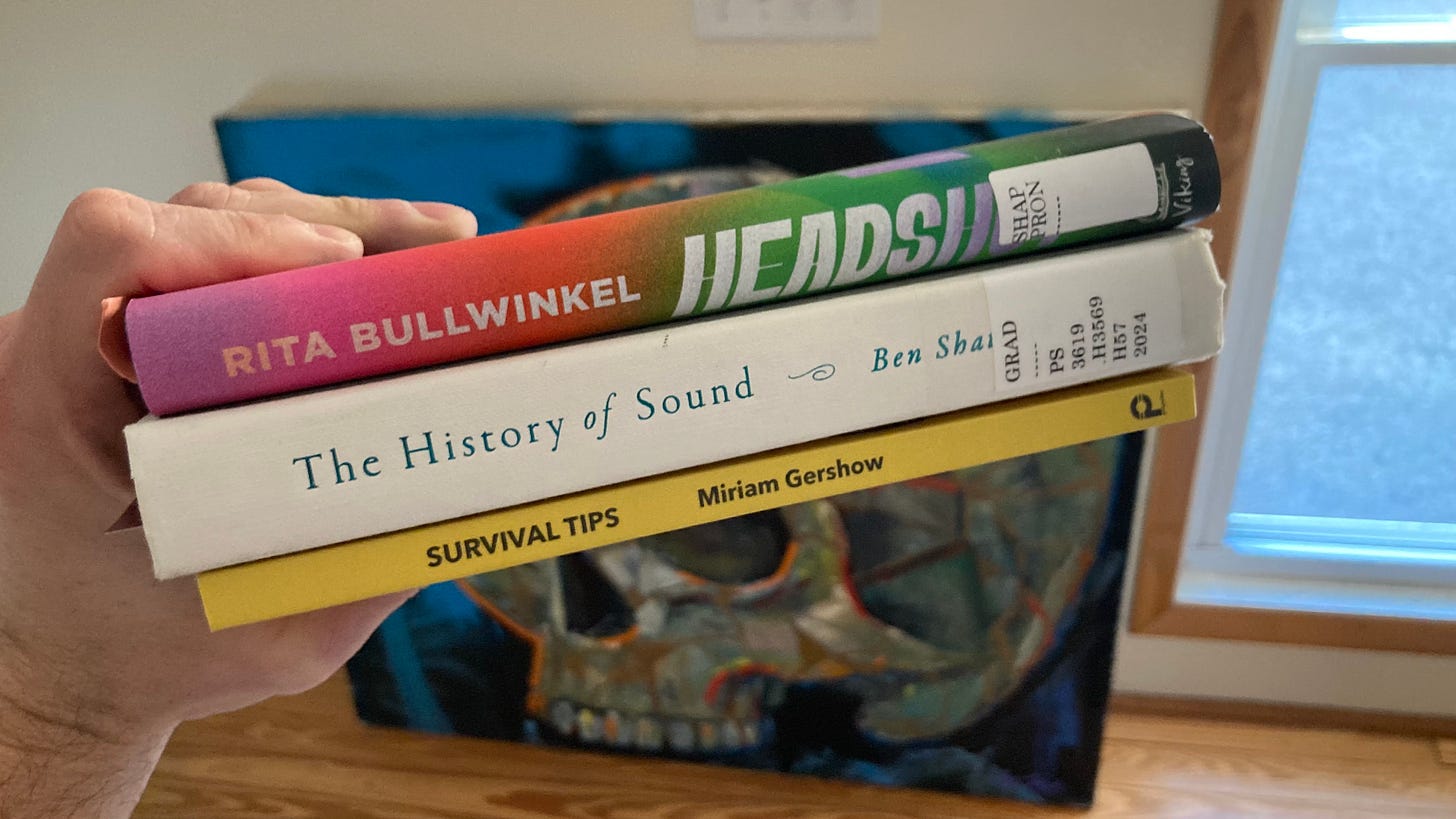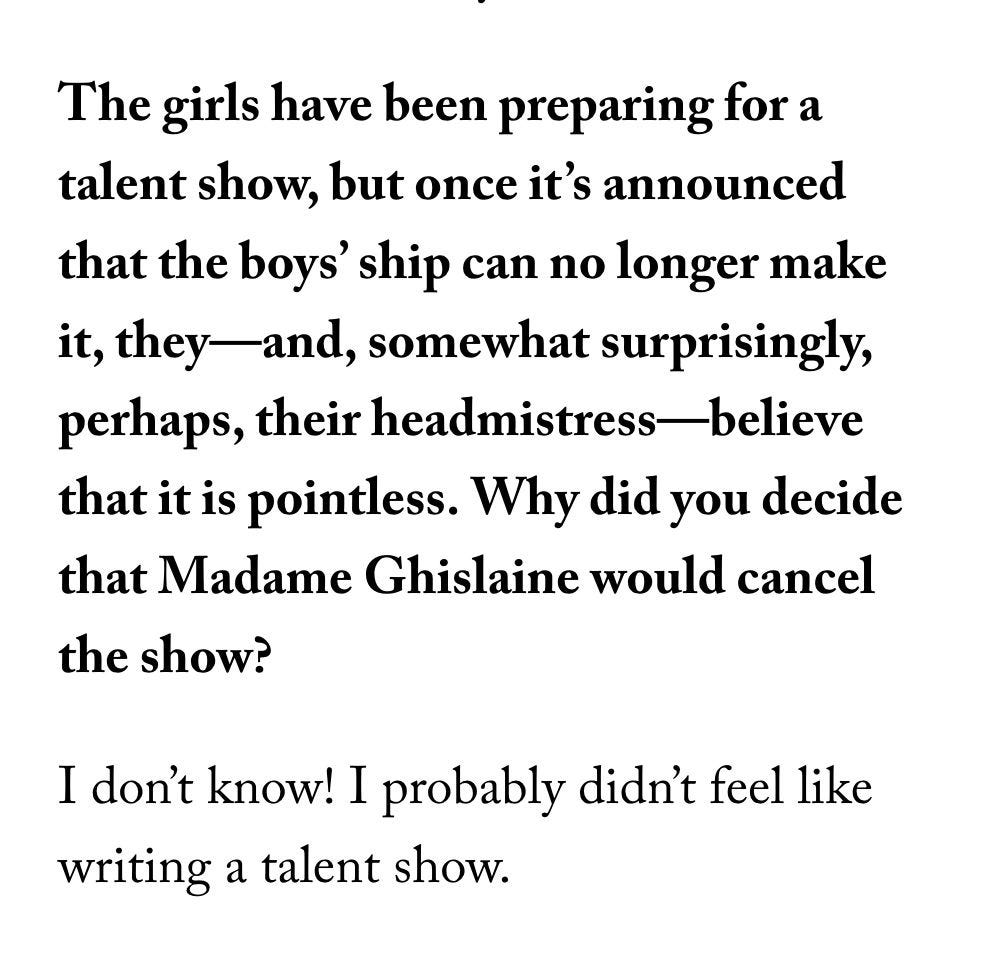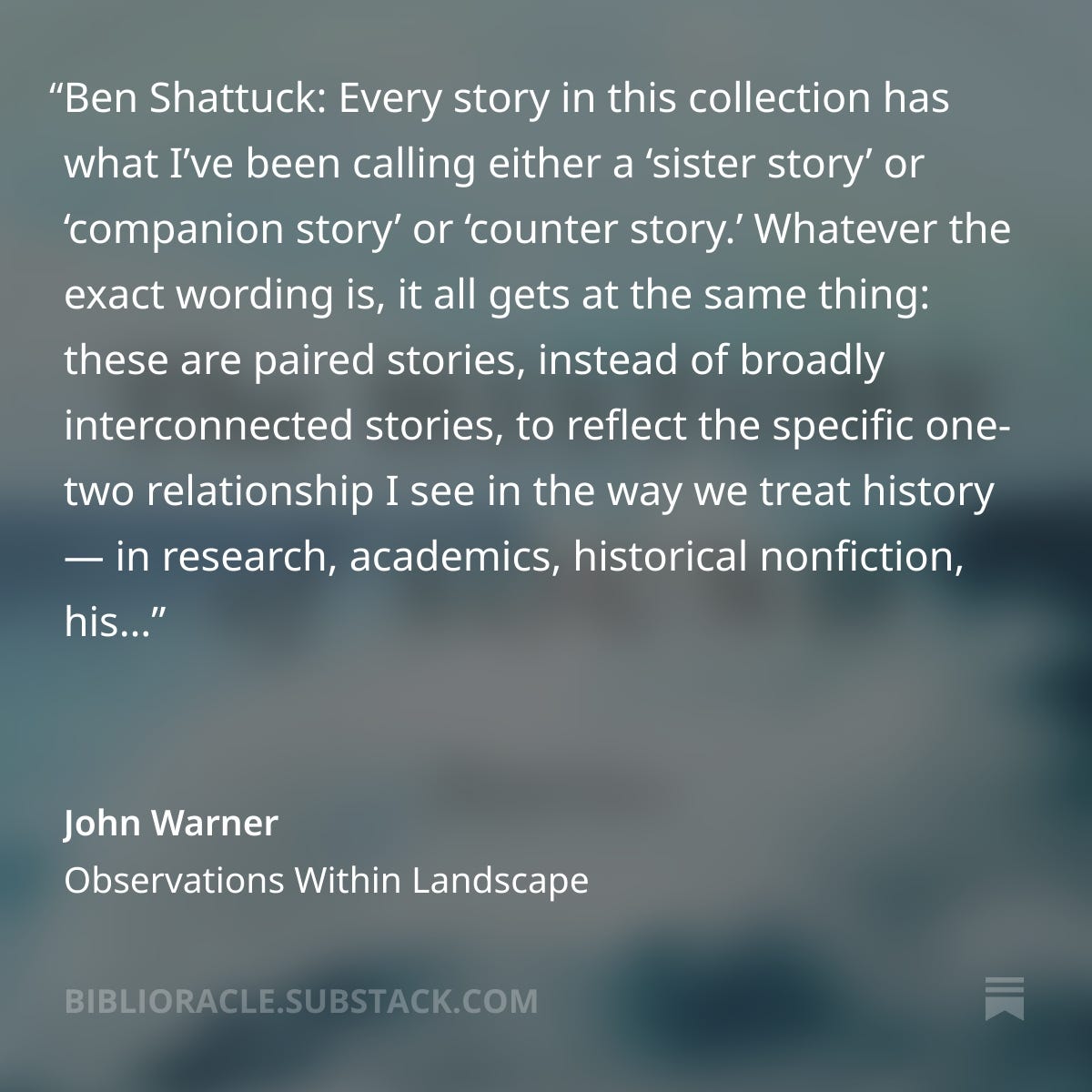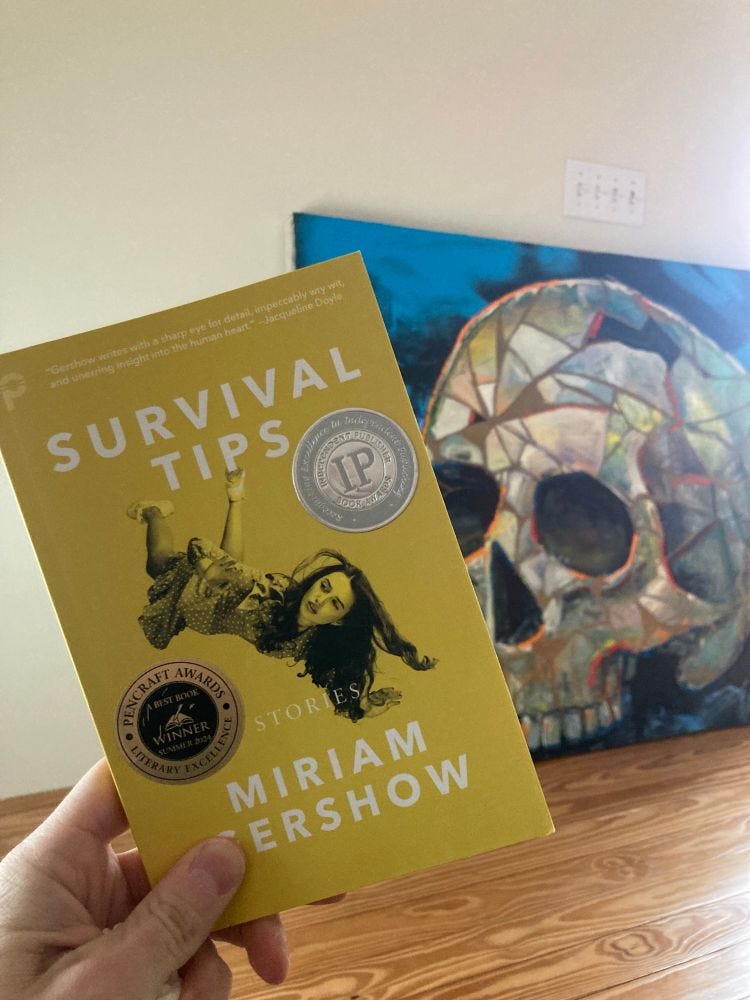2025 week 5 — reading, teaching, writing
Sheila Heti, Danielle Evans, Anna Vangala Jones, Miriam Gershow, Ben Shattuck + some more "show your work" novel drafting...

I’m gonna have some fun personal writing stuff to share next week!
But, for now, this week… classes ramped up a bit, I read a little less, I ran/swam/worked out less than is my goal, I just spent the last three hours doing house stuff because I think we have squirrels in the attic, and… you know… *waves arms at everything*.
Other than all that, a pretty good week, personally, all things considered. I saw The Brutalist last weekend. I liked it! Probably a lot? After seeing it, I texted a friend, “I feel like it was messy and didn’t all work but had some great moments and was often (always?) STRIVING for greatness, and I just super appreciated art wanting and TRYING to be great?” I also cried like three times, which was part movie, and also probably part world and politics and humanity, all topped off with a convo with my dad about family shit right before I saw it, which all definitely had me extra raw.
Anyway. I’m probably going to rush through this all a bit; I’m ready to be done.
the stories I read this week:
Sat. 2/1: “The St. Alwynn Girls at Sea” by Sheila Heti
This story didn’t totally connect with me. I feel like I had a take on why, though as seems to become the case for just about every story I read on Saturday, I don’t really remember much about it here on Friday.
I liked her accompanying interview about the story though!
*
Sun. 2/2: “The Journal of Thomas Thurber” by Ben Shattuck
This is the story that sent me off googling Shattuck, wanting to read an interview with him. I found this great one with John Warner:
I’m gonna come back to this below but, story by story, this is one of the best collections I’ve maybe ever read, and then, on top of that, I love the structure of it being built around these “paired stories.”
*
Mon. 2/3: “Richard of York Gave Battle in Vain” by Danielle Evans
I taught this story on Monday and so read it one more time Monday morning. One of my faves of all time. Everything about it feels masterful and surprising and perfect. I could write a whole post about it. Maybe probably at some point I will. (Maybe at some point this blog will shift from daily log to longer form unpacking of stories? I don’t know. I don’t know much.)
*
Tues. 2/4: “Line of Communication,” “Don’t Leave Me,” “Pipelines Are Pipes,” & “ Book of Adornments” by Miriam Gershow
I woke up kinda early and so had some extra time, and a couple of these are short, and I was just so enjoying them, and so close to finishing the collection, I pushed and read them all and finished it. Really enjoyed! These last four stories, and the collection as a whole!
Faves in the book were probably “Big Home” & “Carter.” Also really enjoyed “Little Girl” & “Congratulations, Baby,” and there’s a handful of shorter pieces that aren’t quite “hermit crabs” but are conceit-/form-forward and all really great. Fun, really strong collection! I dropped into my local bookstore and preorder her novel, Closer, coming in June!
*
Wed. 2/5: “The Legend of the Convenience Store Cashier” by Anna Vangala Jones
Again with the counting a story I taught as my morning read! Not ideal, but so it goes. And not only that, but kinda a cheat (do I mean teaching-wise, or counting as my daily read? I don’t know!) because it’s a story I edited and published. But it’s great! And it’s been a year and a half since I published it, and so was fun and a treat to revisit. And my students seemed into it, which felt rewarding on a number of levels.
*
Thur. 2/6: “Radiolab: Singularities” by Ben Shattuck
I’ve said this about Shattuck stories already and before, but in addition to just being amazing, beautiful stories, there’s something sneaky about them. They’re often kinda quiet burns, almost catching you by surprise by just how much they’re able to make you feel. But then, too, on top of that… they often have some element that I’m a bit biased against. I don’t love historical fiction. It turns out I do in Shattuck’s hands. I don’t love stories in epistolary format. The above mentioned “The Journal of Thomas Thurber” is set in 1907 and told all through Thurbers journals entries, and it became a fave!
This story is written as a transcript of an episode of “Radiolab,” which is fun, and clever, and well done… but I also wondered if too clever? But by the end, it too found a way to hit me even harder than I’d expected.
But then, too, even more than the story on itself, there is that “paired stories” structure of the collection…
*
Fri. 2/7: “The Auk” by Ben Shattuck
“Radiolab: Singularities” is a contemporary story, in the form of a transcript of an episode of “Radiolab,” about this photo from 1991 of a great auk, an animal thought to be extinct and not seen since 1844.
“The Auk,” then, is the story of the man who took the photo in 1991.
I don’t know that either story on its own is my fave in the collection, but the way the two work together is a little unlike anything I’ve read before and something I’m going to think about for a long time.
Here’s something I wrote/revised this week:
As has become my weekly schedule this semester, I went to my fave coffeeshop this morning and wrote for ~3 hours. I’d love to be spending even more time with this novel, but slow and steady adds up and I’m making some good headway and working on it just consistently enough that it is kinda always in my head (I had an idea for another chapter one morning this week while in the shower!), which is really just kinda all you want while working on a novel.
I spent the first hour revisiting what I wrote last week, toying with it, making some tweaks, trying to tighten some language. Last week, I shared this:
Saw lay on his couch, staring up at the ceiling. Unable to fall asleep, unable to slow his brain on its hamster wheel.
He’d run himself exhausted, he’d gone through the motions of as many of the yoga poses as he could remember, he’d tried to meditate his way to some kind of serenity or inner peace. Nothing worked.
“Fine,” aloud, to himself. He jolted up, sprung himself up from the couch. Time to change tactics.
In the back of his closet were boxes and boxes of his life. His memories. Memory boxes. Sawyer went and got them, carried them out to his living room. Going through them was what he did when he didn’t know what else to do. Going through them was one of the ways he punished himself.
Photo albums and yearbooks, birthday and Valentine’s Day cards from exes. Concert tickets, high school graduation pamphlet. An old black plastic film canister of pennies flattened with images of science museums and roadside attractions, another with three quarters given to him by his grandfather — one each from his own year of birth, his son’s, and his grandson’s, Sawyer himself.
This week, that turned into:
Saw stared up at his ceiling. Unable to fall asleep, unable to slow his brain on its hamster wheel.
He’d run himself exhausted, he’d gone through the motions of as many of the yoga poses as he could remember, he’d tried to mediate his way to some kind of serenity or inner peace. Nothing worked.
“Fine,” aloud, to himself. He jolted up, sprung himself from the couch. Time to change tactics.
In the back of his closet were boxes and boxes of his life. Photo albums and yearbooks, birthday and Valentine’s Day cards from exes. Concert tickets, high school graduation pamphlet. An old plastic film canister of pennies flattened with images of science museums and roadside attractions, another with three quarters given to him by his grandfather — one each from his Sawyer’s year of birth; Sawyer’s father, Isaac; his own.
Memory boxes.
Going through them was what he did when he didn’t know what else to do. Going through them was one of the ways he punished himself.
Not that different, nothing worth pointing out and talking about, I don’t think, but a little shuffling and it feels, to my eye and ear, just a little tighter. And it seems kinda fun, and maybe a little interesting, to show off how I spent an hour making such minimal tweaks?
Later in the chapter, looking through a yearbook prompts a memory of Sawyer’s grandfather dying:
Sawyer loved his grandfather. It sometimes seemed like Abe wasn’t just Sawyer and Jack’s grandfather, but everyone’s. He’d started his business in this town, a tiny little storefront that grew and grew, as the town grew around and alongside it. Everyone loved Abe. And Sawyer loved him as grandson loves grandparents, and loved him, too, as proud grandson of grandfather to the whole town.
But underneath that love, twinned to it, was some kind of anger and resentment, too. A feeling he didn’t know the root of, a mystery he hadn’t solved, but one that felt true.
Sawyer’s dad, Isaac, had never said anything disparaging Sawyer or Jack about their grandfather, but he’d had picked up on it. On something.
Isaac had taken over the store when Abe retired, and he’d done well. Continued its growth, expanded to five locations across the state. Only every spoke highly of his father in public, always gave him credit for everything he’d done. For his business acumen, for his devotion to this town. And yet Sawyer couldn’t recall witnessing a single moment of his dad saying a single word to Grampa Abe. Not once; not in the store, not at family gatherings over holidays. Something he’d felt before he’d known, and then once noticed, watched for and proved true.
His father’s son, Sawyer considered his own subtle pangs toward anger resentment a kind of inheritance, mysterious as they may be. He contributed not having cried to these complicated sparring emotions. His father hadn’t cried when he and their mom had told Sawyer and Jack.
It’s probably still a little wonky. Maybe I’ll spend the first hour of my writing time next week toying with it.
It feels nerdy to point this out, but I like those little phrases, “twinned to it” and “a kind of inheritance.” Sawyer and his brother, Jack, are twins, and one of the themes of the novel is their complicated relationship as brothers and one of the manifestations of that will be various things that have or will or won’t be passed down to them.
With pointing that out, I acknowledge the phrasings are maybe too much. Maybe too on-the-nose. They aren’t the kind of phrases or sentences I’d normally write, that kind of thematic mirroring (or pointing finger at?), but at least right now, that very fact of them feeling outside my own typical tendencies as a writer is a big part of why I like them.
Writing! Playing with voice and phrasings and sentences! It can be so (dorky) fun!!
*
Thanks!
—Aaron








Hi Aaron, thanks for re-sharing the Legend of The Convenience Store Cashier and your writing update. I felt the same way you did about St. Alwynn. I made a New Year's resolution to read or listen to the New Yorker story each week; this week's story, Chuka by Chimamanda Ngozi Adichie, is much better. I liked some the conventional wisdom it up-turned and what it had to say about love, desire, and gratitude. The podcast was perfect because I wouldn't have known the pronunciations without the author's voice.